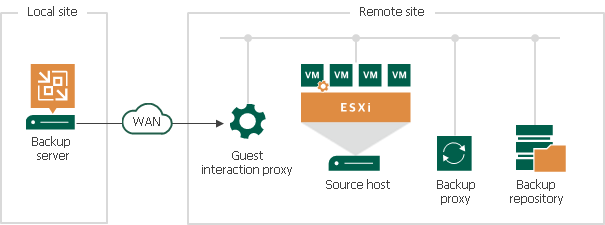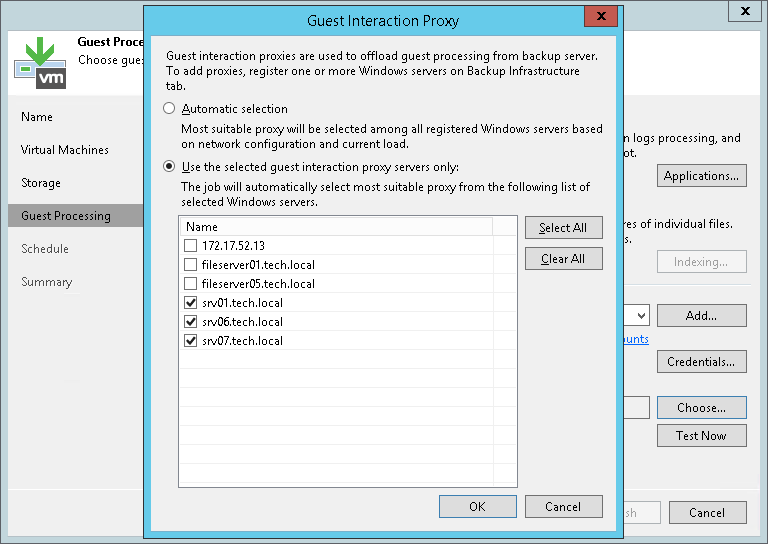来宾交互代理
The guest interaction proxy is a backup infrastructure component that sits between the backup server and processed VM. This component is needed if the backup or replication jobs perform the following processing of VMs:
- Application-aware processing
- Guest file system indexing
- Transaction logs processing
To interact with the VM guest OS, Veeam Backup & Replication needs either to install non-persistent runtime components or use (if necessary, install) persistent agent components in each VM. The task of deploying these components in a VM is performed by the guest interaction proxy. For more information on the components, see Non-Persistent Runtime Components and Persistent Agent Components.
Note |
The guest interaction proxy functionality is included in the Veeam Universal License. When using a legacy socket-based license, Enterprise or higher edition is required. |
The guest interaction proxy allows you to communicate with the VM guest OS even if the backup server and processed VM run in different networks.

Important |
The guest interaction proxy deploys the non-persistent runtime components or persistent agent components only in Microsoft Windows VMs. In VMs with another guest OS, the non-persistent runtime components or persistent agent components are deployed by the backup server. |
Guest Interaction Proxy Deployment
You can use multiple guest interaction proxies to improve performance. Multiple guest interaction proxies will deploy non-persistent runtime components or persistent agent components in VMs faster compared to the same operation performed by one guest interaction proxy.
In a backup infrastructure with multiple remote sites, you can deploy a guest interaction proxy in each site. This can reduce load on the backup server and produce less traffic between the backup server and remote site.
Requirements for Guest Interaction Proxy
A machine performing the role of a guest interaction proxy must meet the following requirements:
- The role of a guest interaction proxy can be assigned to a Microsoft Windows server (physical or virtual).
- You must add the machine to the Veeam Backup & Replication console as a managed server.
- Guest interaction proxy must have either a LAN or VIX connection to the VM that will be processed. You do not have to set up both connections — only one connection is required. For more information about setting up a connection to the VM, see this Veeam KB article.
The guest interaction proxy role can be performed by any machine that meets the requirements, including backup proxy, backup repository, WAN accelerator or backup server.
Guest Interaction Proxy Selection
When you add a Microsoft Windows machine to the backup infrastructure, Veeam Backup & Replication deploys Veeam Data Mover on it. Veeam Data Mover includes the components responsible for deployment of non-persistent runtime components or persistent agent components during guest OS interaction.
To assign a guest interaction proxy for the job, you must select a Microsoft Windows machine that will perform the role of the guest interaction proxy at the Guest Processing step of the backup or replication job wizard. You can assign the guest interaction proxy manually, or let Veeam Backup & Replication do it automatically. Veeam Backup & Replication uses the following priority rules to select the guest interaction proxy:
- A machine in the same network as the protected VM that does not perform the backup server role.
- A machine in the same network as the protected VM that performs the backup server role.
- A machine in another network that does not perform the backup server role.
- A machine in another network that performs the backup server role.
If Veeam Backup & Replication finds several available machines of equal priority, it selects the less loaded machine. The load is defined by the number of tasks that the machine already performs.

Failover from Guest Interaction Proxy to Backup Server
If the guest interaction proxy fails to connect to a Microsoft Windows VM, the guest interaction proxy will not be able to access the VM and deploy non-persistent runtime components or persistent agent components in it. In this case, the backup server will take over the role of guest interaction proxy and deploy the non-persistent runtime components or persistent agent components in the VM.
Related Topics